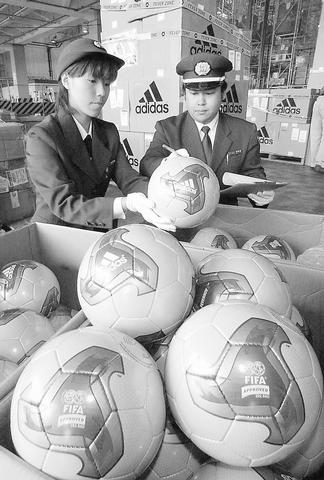Masako Harada canceled her annual vacation and pooled her savings with her bonus to spend more than US$2,500 on tickets for the 2002 World Cup soccer finals.
She didn't stop there. Even though she doesn't like burgers, she ate every day at McDonald's for a month to win tickets in a contest.
She plans to shell out Japanese yen 20,000 (US$155) for a satellite dish to watch the games live on Sky PerfectTV.

PHOTO: AP
"I'll spend whatever it takes to fulfill the World Cup experience," said Harada, 33, a telephone systems engineer.
Japan is counting on these fans, plus almost a half-million foreign visitors, to help the world's second-biggest economy rebound from 12 years of decline that left it with a lower credit rating than first-round opponent Belgium. Economists are skeptical it will get much of a kick.
"There are deeper problems in the Japanese economy for it to simply be pulled out of recession by this event," said Eiji Kitada, an economist at Hamagin Research in Yokohama, where the final game will be played June 30. Among them: a five-year decline in bank lending, 2 1/2 years of falling prices and a jobless rate stuck near a record high.
In addition, the first World Cup held in Asia is also the first hosted by two countries. Japan, which built seven new stadiums for the May 31-June 30 tournament, will reap only half the benefits of being a host because it will split the 64 games with South Korea.
An increase in spending by fans, officials and the media may come at the expense of reduced spending on movies, the theatre and other forms of entertainment as people stay at home to watch games on TV, economists said.
World Cup spending will add just 0.3 percentage point to gross domestic product in the three months ending June 30, said Shinichiro Kawasaki, a senior economist at Dai-Ichi Life Research Institute.
That may not be enough to avoid the economy shrinking further -- gross domestic product will shrink 0.2 percent this quarter, according to the latest Bloomberg News survey.
In Yokohama, 45 minutes by train from downtown Tokyo, local merchants share the pessimism of economists.
Take Hiroko Tominaga, who runs a bakery next door to Kozukue Station, the closest train station to the 72,370-seat Yokohama International Stadium. She doesn't plan anything special to commemorate the games, such as soccer ball-shaped cakes.
"It just wouldn't be worth it to do something special," she said. "It will be like any other business day."
Others are more confident. Sky Perfect Communications Inc, Japan's biggest pay-television operator, the only Japanese broadcaster showing all 64 matches live, aims to sign up 360,000 new customers by the end of the tournament, spokeswoman Naoko Ohya said.
Adidas-Salomon AG, the official supplier of this year's tournament balls, forecasts sales will rise 30 percent in Japan this year, helping it meet its goal of overtaking Nike Inc as the largest seller of branded sporting goods in Japan.

SECURITY: As China is ‘reshaping’ Hong Kong’s population, Taiwan must raise the eligibility threshold for applications from Hong Kongers, Chiu Chui-cheng said When Hong Kong and Macau citizens apply for residency in Taiwan, it would be under a new category that includes a “national security observation period,” Mainland Affairs Council (MAC) Minister Chiu Chui-cheng (邱垂正) said yesterday. President William Lai (賴清德) on March 13 announced 17 strategies to counter China’s aggression toward Taiwan, including incorporating national security considerations into the review process for residency applications from Hong Kong and Macau citizens. The situation in Hong Kong is constantly changing, Chiu said to media yesterday on the sidelines of the Taipei Technology Run hosted by the Taipei Neihu Technology Park Development Association. With

CARROT AND STICK: While unrelenting in its military threats, China attracted nearly 40,000 Taiwanese to over 400 business events last year Nearly 40,000 Taiwanese last year joined industry events in China, such as conferences and trade fairs, supported by the Chinese government, a study showed yesterday, as Beijing ramps up a charm offensive toward Taipei alongside military pressure. China has long taken a carrot-and-stick approach to Taiwan, threatening it with the prospect of military action while reaching out to those it believes are amenable to Beijing’s point of view. Taiwanese security officials are wary of what they see as Beijing’s influence campaigns to sway public opinion after Taipei and Beijing gradually resumed travel links halted by the COVID-19 pandemic, but the scale of

A US Marine Corps regiment equipped with Naval Strike Missiles (NSM) is set to participate in the upcoming Balikatan 25 exercise in the Luzon Strait, marking the system’s first-ever deployment in the Philippines. US and Philippine officials have separately confirmed that the Navy Marine Expeditionary Ship Interdiction System (NMESIS) — the mobile launch platform for the Naval Strike Missile — would take part in the joint exercise. The missiles are being deployed to “a strategic first island chain chokepoint” in the waters between Taiwan proper and the Philippines, US-based Naval News reported. “The Luzon Strait and Bashi Channel represent a critical access

Pope Francis is be laid to rest on Saturday after lying in state for three days in St Peter’s Basilica, where the faithful are expected to flock to pay their respects to history’s first Latin American pontiff. The cardinals met yesterday in the Vatican’s synod hall to chart the next steps before a conclave begins to choose Francis’ successor, as condolences poured in from around the world. According to current norms, the conclave must begin between May 5 and 10. The cardinals set the funeral for Saturday at 10am in St Peter’s Square, to be celebrated by the dean of the College